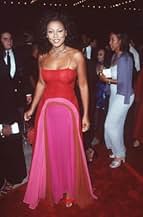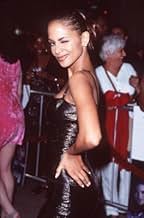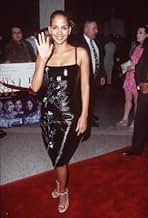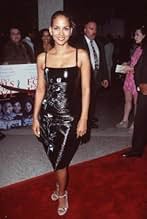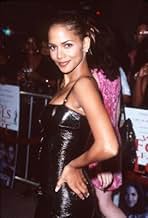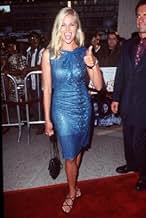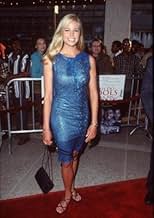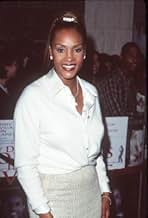IMDb RATING
6.4/10
4.7K
YOUR RATING
Three women each claim to be the widow of 1950s doo-wop singer Frankie Lymon, claiming legal rights to his estate.Three women each claim to be the widow of 1950s doo-wop singer Frankie Lymon, claiming legal rights to his estate.Three women each claim to be the widow of 1950s doo-wop singer Frankie Lymon, claiming legal rights to his estate.
- Awards
- 2 wins & 4 nominations total
Miguel A. Núñez Jr.
- Young Little Richard
- (as Miguel A. Nunez Jr.)
- Director
- Writer
- All cast & crew
- Production, box office & more at IMDbPro
Storyline
Did you know
- TriviaWhen Tina Andrews wrote the original script, the part of Frankie Lymon was first offered to Michael Jackson.
- GoofsWhen the scenes changes to Lamberton Prison in 1985, Diana Ross' version of "Why Do Fools" is more than once referred to as a new hit, when in fact, it was released in 1981.
- Quotes
Emira Eagle: Maybe there were three separate Frankies, and each of us got a piece.
- SoundtracksWhy Do Fools Fall in Love
Written by Frankie Lymon and Morris Levy
Performed by Frankie Lymon and the Teenagers
Courtesy of Rhino Entertainment Company/EMI Records UK Ltd.
Featured review
An interesting (but flawed account) of the battle over pop star Frankie Lymon's estate by three women claiming to be his widow...
The story portrayed here is actually semi-fictitious, but the background story of Frankie's life is entirely true.
From his starts as a fresh-faced Harlem kid to a haunted drug addict, Larenz Tate (one of the most underrated talents in Hollywood) shines as dreamer Frankie, and does well to give perspective to Frankie's conflicting attitudes towards his relationships with the women, which the script muddles- Frankie appears shallow yet introspective at the same time.
Halle Berry tries to make more of her understated and thin role as Zola Taylor, wifey no. 2, but provides an adequate performance.
The most developed of the three female characters, is Elizabeth Waters (Viveca A. Fox). Loyal yet dishonest, gritty Elizabeth is the only character aside from Frankie that seems to be real. This is a combined effort by the characterisation and the performance by Fox.
And Lela Rochon does very well cast against type, as a school marm dragged into this battle. Rochon clearly understands the character well, and manages to make her mark on the story despite being developed late into the film.
The period detail of this piece is well captured over the 20-odd years that this story is set (particularly the performances of Frankie with the Teenagers), and even the small scenes which provide insight into Frankie's younger days.
The main flaws of this film lie essentially in the struggle to develop some of the themes. As mentioned earlier, Frankie's reasons for bigamy are not established at all or how he copes this with this, or whether one of the wives in particular is lying about the legitimacy of her marriage.
Some of the characterisation is a bit thin, caused by some of the later events of the film and because this deep story of fame, loss, betrayal and torment has such a muddled structure the whole film comes across as sketchy by the end which clearly was not intended.
But never the less this is an adequate tribute, to the world of fame and its inevitable clingers-on, and those just caught up in the action. This will never be top of its genre however...
The story portrayed here is actually semi-fictitious, but the background story of Frankie's life is entirely true.
From his starts as a fresh-faced Harlem kid to a haunted drug addict, Larenz Tate (one of the most underrated talents in Hollywood) shines as dreamer Frankie, and does well to give perspective to Frankie's conflicting attitudes towards his relationships with the women, which the script muddles- Frankie appears shallow yet introspective at the same time.
Halle Berry tries to make more of her understated and thin role as Zola Taylor, wifey no. 2, but provides an adequate performance.
The most developed of the three female characters, is Elizabeth Waters (Viveca A. Fox). Loyal yet dishonest, gritty Elizabeth is the only character aside from Frankie that seems to be real. This is a combined effort by the characterisation and the performance by Fox.
And Lela Rochon does very well cast against type, as a school marm dragged into this battle. Rochon clearly understands the character well, and manages to make her mark on the story despite being developed late into the film.
The period detail of this piece is well captured over the 20-odd years that this story is set (particularly the performances of Frankie with the Teenagers), and even the small scenes which provide insight into Frankie's younger days.
The main flaws of this film lie essentially in the struggle to develop some of the themes. As mentioned earlier, Frankie's reasons for bigamy are not established at all or how he copes this with this, or whether one of the wives in particular is lying about the legitimacy of her marriage.
Some of the characterisation is a bit thin, caused by some of the later events of the film and because this deep story of fame, loss, betrayal and torment has such a muddled structure the whole film comes across as sketchy by the end which clearly was not intended.
But never the less this is an adequate tribute, to the world of fame and its inevitable clingers-on, and those just caught up in the action. This will never be top of its genre however...
- How long is Why Do Fools Fall in Love?Powered by Alexa
Details
Box office
- Gross US & Canada
- $12,461,773
- Opening weekend US & Canada
- $3,946,382
- Aug 30, 1998
- Gross worldwide
- $12,461,773
- Runtime1 hour 56 minutes
- Sound mix
- Aspect ratio
- 1.85 : 1
Contribute to this page
Suggest an edit or add missing content

Top Gap
By what name was Why Do Fools Fall in Love (1998) officially released in Canada in English?
Answer

